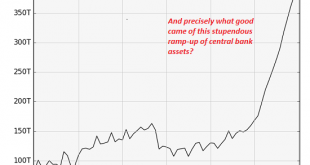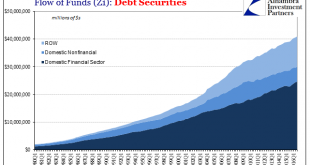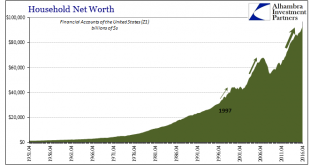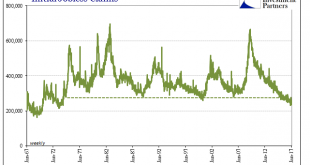A gold bond is debt obligation that is denominated in gold, with interest and principal paid in gold. As I will explain below, it’s a way for the issuer to pay off its debt in full, and there are other advantages. Sometimes, I find that it’s helpful to show a picture of what I’m talking about. At the Harvard Club in New York, an old gold bond is hanging on the wall among other memorabilia. This is a gold bond bought by...
Read More »The Big Reversal: Inflation and Higher Interest Rates Are Coming Our Way
This interaction will spark a runaway feedback loop that will smack asset valuations back to pre-bubble, pre-pyramid scheme levels. According to the conventional economic forecast, interest rates will stay near-zero essentially forever due to slow growth. And since growth is slow, inflation will also remain neutral. This forecast is little more than an extension of the trends of the past 30+ years: a secular decline in...
Read More »Currency Risk That Isn’t About Exchange Values (Eurodollar University)
This week the Bureau of Economic Analysis will release updated estimates for Q2 GDP as well as Personal Consumption Expenditures (PCE) and Personal Incomes for July. Accompanying those latter two accounts is the currently preferred inflation standard for the US economy. The PCE Deflator finally hit 2% and in two consecutive months, after revisions, earlier this year. - Click to enlarge The inability of consumer...
Read More »On Cheques
On his blog, JP Koning discusses the versatility of cheques: A cheque instructs a bank to transfer deposits. It is a derivative on bank deposits. A post dated cheque serves as debt instrument, e.g., vis-a-vis pay day lenders. An uncashed cheque may serve as money if marked “to bearer” or endorsed by the recipient. Laws grant cheques currency status. A cheque may be used for payments even if other payment mechanisms break down. During the Irish banking strike of 1970, “for six months...
Read More »Legal Tender
Dave Birch blogs about the concept of legal tender: a means to discharge debt. … you cannot force a retailer to accept legal tender or indeed any other form of tender. If, however, you buy something from them and there is no contractual barrier to the use of any form of tender, and you offer legal tender in payment, and they refuse it, then they cannot enforce the debt in court. That’s what legal tender means: it’s about discharging debts. If you incur a debt you can discharge it with...
Read More »Government Debt with State Contingent Coupons
On VoxEU, Myrvin Anthony, Narcissa Balta, Tom Best, Sanaa Nadeem, and Eriko Togo discuss the history of government debt with state contingent coupons and offer some lessons. In the mid-19th century, the Confederate states issued cotton-linked bonds In the late 1970s, Mexico issued oil-linked bonds In the 2000s, Turkey issued revenue-indexed bonds Since 2014, Uruguay issues nominal wage-issued bonds Some other examples (figure taken from the column): Obviously, confidence in data quality...
Read More »Predictors of Default
On Science of Us, Seth Stephens-Davidowitz reports about predictors of loan repayment choices. … language that potential borrowers use is a strong predictor of their probability of paying back. And it is an important indicator even if you control for other relevant information lenders were able to obtain about those potential borrowers, including credit ratings and income. … Here are the phrases used in loan applications by people most likely to pay them back: debt-free, lower interest...
Read More »Do Record Debt And Loan Balances Matter? Not Even Slightly
We live in a non-linear world that is almost always described in linear terms. Though Einstein supposedly said compound interest is the most powerful force in the universe, it rarely is appreciated for what the statement really means. And so the idea of record highs or even just positive numbers have been equated with positive outcomes, even though record highs and positive growth rates can be at times still associated...
Read More »No Paradox, Economy to Debt to Assets
It is surely one of the primary reasons why many if not most people have so much trouble accepting the trouble the economy is in. With record high stock prices leading to record levels of household net worth, it seems utterly inconsistent to claim those facts against a US economic depression. Weakness might be more easily believed as some overseas problem, leading to only ideas of decoupling or the US as the “cleanest...
Read More »Jobless Claims Look Great, Until We Examine The Further Potential For What We Really, Really Don’t Want
Initial jobless claims fell to just 234k for the week of February 4, nearly matching the 233k multi-decade low in mid-November. That brought the 4-week moving average down to just 244k, which was a new low going all the way back to the early 1970’s. Jobless claims seemingly stand in sharp contrast to other labor market figures which have been suggesting an economic slowdown for nearly two years. Unemployment insurance...
Read More » Swiss Economicblogs.org
Swiss Economicblogs.org






